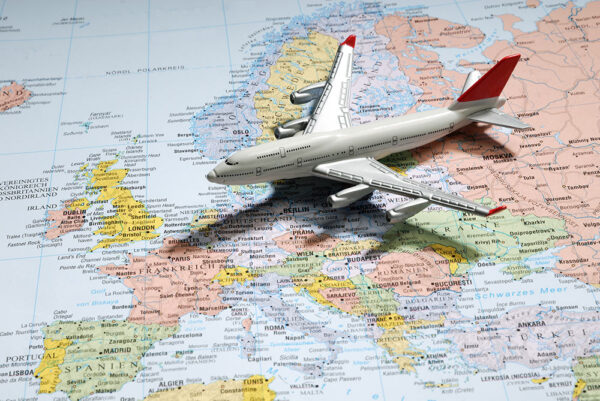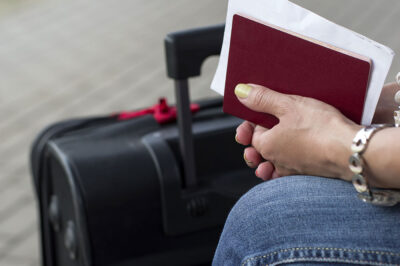Embarking on a journey to Europe this summer? It’s essential to prioritize your safety and security while exploring the diverse and enchanting countries that this continent has to offer. By following these expert travel tips and utilizing reliable safety apps, you can ensure a worry-free and enjoyable experience in popular European destinations like France, Italy, Spain, and beyond.

1) Conduct Thorough Safety Research for Each European Destination
Before you set foot in any European country, conduct comprehensive safety research. Take advantage of online resources such as Google search and news platforms to stay informed about any recent events or situations that may impact your travel safety and security. Additionally, consult reputable sources like the State Department for current safety information specific to each European destination. Check for travel alerts, embassy contact information, health advisories, and other essential details. It’s always helpful to reference multiple sources to gain a well-rounded understanding of the safety landscape. Set up Google Alerts to receive real-time updates on current events, ensuring you stay informed without succumbing to irrational fear. Speak with a dedicated travel security service to keep your organization’s travelers supported for security or medical emergencies.
Enroll in the State Department’s Smart Traveler Enrollment Program (STEP). This free service allows you to register your trip with the nearest Embassy or Consulate in Europe, providing them with your contact details. In case of emergencies, they can reach out to you and assist your family and friends in doing the same. By enrolling in STEP, you will also receive real-time safety information and updates related to your European travel. Additionally, be mindful of cultural considerations in each European country to ensure respect and a more immersive experience. Familiarize yourself with cultural norms and expectations, such as appropriate clothing for specific cultures or religious sites.
2) Safeguard Your Identity and Travel Documents
 Protecting your identity and travel documents is crucial for a smooth and secure European journey. Make copies of important documents such as your passport, itinerary, driver’s license, and insurance. Create two sets of copies and store them in separate bags. It’s also a good idea to share these copies with a trusted person back home as a precautionary measure. Carry essential contact information with you, including the name, address, and phone number of your accommodation in each European destination. Grab a business card from your hotel or note down the necessary details. If you’re on a guided tour, keep the contact information of your tour operator or travel agent readily available. It’s also wise to have the embassy information of your home country in Europe for easy access in case of emergencies.
Protecting your identity and travel documents is crucial for a smooth and secure European journey. Make copies of important documents such as your passport, itinerary, driver’s license, and insurance. Create two sets of copies and store them in separate bags. It’s also a good idea to share these copies with a trusted person back home as a precautionary measure. Carry essential contact information with you, including the name, address, and phone number of your accommodation in each European destination. Grab a business card from your hotel or note down the necessary details. If you’re on a guided tour, keep the contact information of your tour operator or travel agent readily available. It’s also wise to have the embassy information of your home country in Europe for easy access in case of emergencies.
Maps are invaluable tools when navigating European cities. Consider carrying hard-copy maps as backups for your electronic devices. Register for the State Department’s STEP for safe traveling. Additionally, ensure you have at least one map app installed on your smartphone. Even if you don’t have international data, you can view maps on Wi-Fi and take screenshots for offline use.
3) Use Common Sense for Safe European Travel
Whether you’re strolling through the streets of Paris or exploring the winding alleys of Rome, common sense is your best ally in ensuring personal safety. Be always aware of your surroundings and exercise extra vigilance in crowded areas and during nighttime outings. Read up on common thefts and scams. Trust your instincts, and if something feels unsafe, remove yourself from the situation. In the unfortunate event of a robbery, comply with the perpetrator’s demands and prioritize your well-being. Avoid drawing unnecessary attention by refraining from wearing expensive jewelry or openly displaying valuable electronics.
Create a basic emergency plan with your travel partner(s) to address potential situations where you may get separated. Agree on a meeting point, such as your hotel, within a reasonable time frame, ensuring no one is left searching aimlessly. Equip yourself with a small flashlight, first-aid kit, and a multi-tool device like a Swiss Army Knife or Leatherman, which can prove incredibly useful during unexpected circumstances.
4) Optimize Card Security for Peace of Mind
Protecting your cards and minimizing the risk of theft should be a top priority when traveling in Europe. Before your journey, leave behind any irrelevant cards that you won’t need during your trip. Streamlining your wallet helps you focus on the essential cards required. Inform your credit card and ATM card companies about your travel dates and European destinations, so they’re aware of your itinerary and can monitor any suspicious activity. Please make a note of their international contact numbers in case of theft or other emergencies. Consider leaving one credit card securely in your hotel room while exploring to have an extra layer of protection.
5) Secure Your Cash While Traveling in Europe
When it comes to carrying and accessing cash in Europe, organization and discretion are key. Arrange your money in a way that allows for quick and easy access while minimizing the display of large amounts of cash. Keep small denominations readily available for tips to avoid frequently exposing your wallet. Leave a portion of your cash securely stored in your room, reducing the amount you carry on your person.
Exercise caution and discretion when using ATMs, opting for those located in banks, which tend to be more secure. Cover the keypad with your other hand while entering your PIN and be vigilant of any suspicious individuals nearby. Swiftly store your card and money after each transaction. Pay attention to the ATM’s card insert slots; loose, scratched, blocked, or bulky slots may indicate tampering. Exercise caution when using ATMs, whether you’re in the suburbs or subtropical regions of Europe.
6) Safeguard Your Valuables While Traveling in Europe
Minimize the risk of theft by only bringing essential valuables with you during your European adventure. Leave behind any unnecessary items that may tempt opportunistic individuals. Avoid leaving money or expensive belongings unattended in plain sight, as it may attract unwanted attention.

Keep your cash, cards, and identification securely stored in your room. If your accommodation lacks a reliable safe or has one that can be easily carried away, use a lock on your largest suitcase for added protection. When in transit, keep your backpack on your lap or between your feet, ensuring it remains within your line of sight. Refrain from storing valuables in outer pockets. Female travelers should opt for cross-body purses and keep them positioned in front of their bodies, while male travelers can safeguard their wallets by keeping them in their front pockets or placing a hand on their back pockets in crowded areas. Clarify whether the cab fares are flat rates or metered, and agree on a price with the driver before entering the vehicle.
7) Prioritize Your Health and Well-being
Maintaining good health while exploring Europe is essential for an enjoyable trip. Take precautions by carrying additional prescription medications, glasses, and contact lenses in your carry-on bag. Pack these essential items along with any other critical medication or medical supplies you may require during your journey.
Research whether your European destination requires specific vaccinations or additional immunizations based on your planned activities and locations. Begin this process early, as some vaccines may require multiple doses or time to take effect. Consult reputable sources such as the Centers for Disease Control and Prevention or a travel medicine doctor for accurate information and guidance. In case of medical emergencies, contact your doctor back home for advice or a second opinion. U.S. embassies and consulates in Europe can also aid in finding English-speaking doctors.
8) Understand Your Health Insurance Coverage
 Evaluate your existing health insurance to determine whether it covers medical care received abroad. Some tour companies and member organizations offer additional benefits, such as medical referrals and discounts on supplemental insurance. If you’re an older traveler or have specific health concerns, consider supplemental insurance to ensure comprehensive coverage during your European trip. Review the terms and conditions of your insurance policy, paying attention to key factors like coverage for illnesses, pre-existing conditions, and treatment in foreign countries. For remote or volatile areas, consider investing in international medical evacuation insurance, which can provide peace of mind and financial protection if needed. Certain insurance plans may even offer assistance for non-medical evacuations.
Evaluate your existing health insurance to determine whether it covers medical care received abroad. Some tour companies and member organizations offer additional benefits, such as medical referrals and discounts on supplemental insurance. If you’re an older traveler or have specific health concerns, consider supplemental insurance to ensure comprehensive coverage during your European trip. Review the terms and conditions of your insurance policy, paying attention to key factors like coverage for illnesses, pre-existing conditions, and treatment in foreign countries. For remote or volatile areas, consider investing in international medical evacuation insurance, which can provide peace of mind and financial protection if needed. Certain insurance plans may even offer assistance for non-medical evacuations.
9) Manage Your Technology Wisely While Traveling in Europe
Electronic devices are valuable tools for staying connected and capturing memories during your European travels. However, it’s important to exercise caution and minimize risk by bringing only the devices you truly need. Before departing, back up all your When accessing the internet outside your trusted network, utilize hotspot technology and take advantage of the widespread availability of Wi-Fi. This allows you to stay connected via email, social media, and communication apps like FaceTime and Skype. However, be cautious when entering passwords or accessing sensitive information on public computers or Wi-Fi networks, as they may pose security risks. Prior to your trip, contact your mobile carrier to fully understand roaming and data charges to avoid any unexpected expenses.
Don’t forget to take measures to protect your home during your European adventure. Set your home alarm system and inform your security company about your travel plans. Utilize timer and motion lights to create the illusion of occupancy. Notify trusted neighbors about your absence and request their assistance in keeping an eye on your property. Double-check that all doors and windows are securely locked before leaving. Consider suspending mail delivery or having a trusted person collect it for you. Additionally, unplug major electronics to prevent any potential damage from power surges or electrical issues.

As you prepare for your European journey, remember that prioritizing safety and security is essential for a worry-free and enjoyable trip. By implementing these travel tips and utilizing reliable safety apps, such as travel safety apps for iPhone and Android, you can navigate Europe with confidence. Whether you’re exploring the picturesque streets of Paris, savoring Italian cuisine in Rome, or enjoying the vibrant atmosphere of Barcelona, embrace your European adventure with peace of mind and unforgettable experiences.


